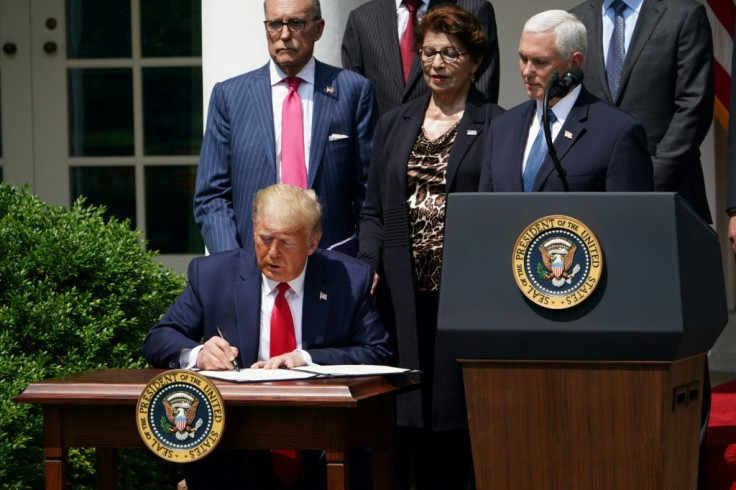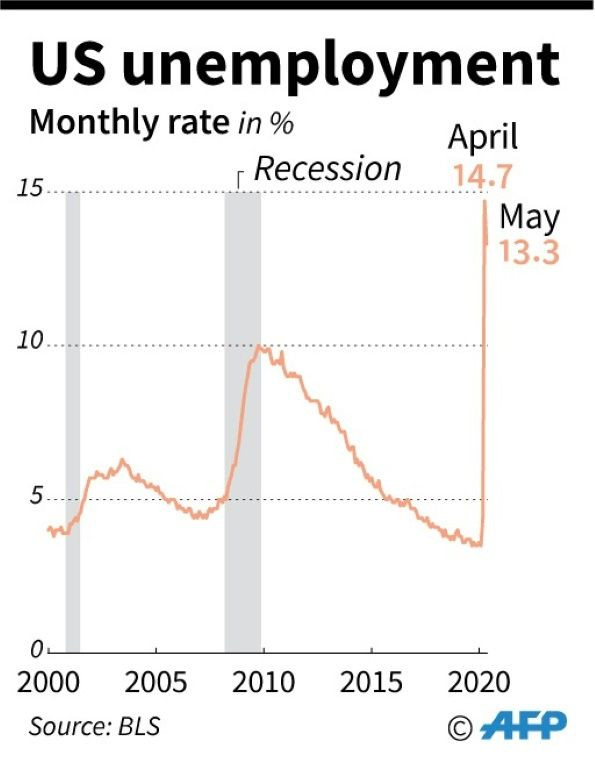Trump Declares America Back After Good Jobs Report

President Donald Trump declared the US economy in "rocket" mode Friday after data showed a surprising recovery in the coronavirus-ravaged jobs market -- lifting his own sinking reelection chances in the process.
"This is a rocket ship," Trump said in a hastily convened celebratory statement in the White House's Rose Garden.
Where markets had been bracing for yet another worsening in the unemployment rate, the Labor Department said that 2.5 million jobs were instead added in May. That brought the jobless rate from 14.7 to 13.3 percent -- not up to the feared 20 percent or higher.
Despite calling a press conference, Trump took no questions from reporters about the coronavirus pandemic and nationwide unrest over the brutal death in police custody of a black man, George Floyd.
Trump clearly didn't want to mar the good news on jobs, which he hopes will provide a path to regaining his once seemingly solid march toward a second term in November.
After months of criticism over his hit-and-miss handling of the pandemic and outrage among even some top former aides over his suggestion of a military crackdown or police brutality against protesters, Trump is at the lowest ebb of his presidency. Polls show him losing to Democratic challenger Joe Biden.
Now with hard data to back his prediction that economic devastation from the coronavirus shutdown will quickly ease, Trump feels his political mojo coming back.
"We've made every decision correctly," he stated in a blanket dismissal of critics who say his management has ranged from incomplete to shambolic.

"We had the greatest economy in the history of the world. And that strength let us get through this horrible pandemic, largely through, I think we're doing really well," he said.
Trump then flew off for the day to Maine, a state he hopes will help carry him over the top in a tight race against Biden.

The Labor Department attributed the job improvements to "a limited resumption of economic activity that had been curtailed in March and April due to the coronavirus (COVID-19) pandemic and efforts to contain it."
However, as it has for the past two months, the Labor Department said the jobless rate was likely three points higher due to errors in how workers described their job status.
A separate report showing state data on weekly initial claims for unemployment benefits showed over 42 million people have lost their jobs, at least temporarily, since mid-March when the shutdowns to contain the spread of COVID-19 began.
But with a massive $3 trillion infusion of government aid, and trillions more in lending to businesses, economists say it is likely firms were able to bring workers back.
"If this sticks, and my guess is it will, we're seeing a faster reopening than most expected, and a quicker unleashing of pent-up demand," economist Jared Bernstein of the Center on Budget and Policy Priorities said on Twitter.
Ian Shepherdson of Pantheon Macroeconomics, one of few who anticipated positive news in the jobs data, called the report, "The biggest payroll surprise in history, by a gigantic margin."
Gains were especially sharp in leisure and hospitality, construction, retail trade and education and health services, according to the data.
The number of workers on temporary layoff declined by 2.7 million to 15.3 million, in a sign people have been able to return to their jobs now that social distancing and lockdown rules are easing nationwide.
But Harvard economist Jason Furman noted that the reduction in temporary layoffs was "the easy part of the recovery," and further job gains may come more slowly.
The data also reflect the time before the killing of Floyd and the ensuing nationwide protests, some of which deteriorated into widespread looting and arson.
© Copyright AFP {{Year}}. All rights reserved.





















